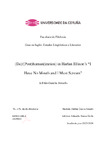(De)/(Post)human(ization) in Harlan Ellison’s “I Have No Mouth and I Must Scream”

Use este enlace para citar
http://hdl.handle.net/2183/41004Coleccións
Metadatos
Mostrar o rexistro completo do ítemTítulo
(De)/(Post)human(ization) in Harlan Ellison’s “I Have No Mouth and I Must Scream”Autor(es)
Director(es)
Barros-Grela, EduardoData
2024Centro/Dpto/Entidade
Universidade da Coruña. Facultade de FiloloxíaDescrición
Traballo fin de grao (UDC.FIL). Inglés: estudios lingüísticos y literarios. Curso 2023/2024Resumo
[Abstract] The purpose of this BA thesis is to examine the stratified notion of humanity, as well as its
antithesis and eventual transgression, as depicted in Harlan Ellison’s science-fiction short
story “I Have No Mouth and I Must Scream” (1967). The analysis delves into the essential
constituents of human nature, in resistance against a dystopic sphere. Thereafter, this end-of degree dissertation counterpoises humanity with its immediate collapse, engendered by a
calculated apparatus of cataclysmic torment, thus architecting a distillation of anthropic
experience. Lastly, the analysis focuses on the posthuman dismantling of archetypical,
universalistic hierarchies characteristic of human practice as portrayed in the text. Hence, this
analysis contrives to determine whether its conclusion designs humanity as victor, or if it has
otherwise been transformed beyond repair—regardless of its attempts of resistance—into an
entity that transcends traditional definitions of the human continuum.
The contentions here introduced are rooted on a close-reading analysis of the short
story, while also taking into consideration its place within its specific authorial and literary
context, pertaining to the emergence of New-Wave Science Fiction and Ellison’s role in such
a transition. Furthermore, this end-of-degree thesis dissects—and expounds upon— a
referential body concerning previous research on Ellison’s work, predominantly regarding his
purposeful embedment of religious innuendoes, coupled with his omniscient rendition of the
master-computer. Additionally, academic reinterpretations of the story’s latent psychological
narrative, along with the resulting identitarian conundrums, are also considered.
This undergraduate thesis implements conceptuality surmised under the
poststructuralist frame—chiefly pertaining to Foucauldian philosophy—, alongside
postmodernist thought and its position on decentralized hybrid identities. In direct
correlation, this thesis delves into posthumanist aversion towards anthropocentric belief,
resulting in humankind’s idiosyncratic reformulation, coupled with the emergence of
transhuman singularity and existential protraction through technology. Additionally, the
analysis incorporates minor adjuvant nuances of revised psychoanalysis and philosophical
treatises that support the forthcoming discourse.
This analysis of Harlan Ellison’s text yields a series of conclusions regarding its
projection of the downfall of humanity and the surviving remnants of human qualities. While
the denouement of the conflict between technological dictatorship and human uprising is
ambiguous in its portrayal, it is the ferociousness of humanity’s unyielding willpower that
cathartically puts an end to its own suffering. In so doing, and through its symbiotic
convergence with machinery, humanity is impelled into an alternate—even superior—state of
interrelationship with itself and its surrounding circumstances. Such findings engender
several implications regarding the analysis of the text. Ellison’s short story may not be
conceived as a misanthropic and technophobic narrative, but as a vanguard for human
protagonism embedded within mechanized environs. As such, the text is transformed into a
hyper-narrative encompassing humanity’s role in its own transition into an epistemic beyond
that may be further explored through continuous revisions of the narrative’s undertones.
Palabras chave
Harlan Ellison
Autonomy
Dehumanization
Posthumanism
Transhumanism
Simulacra
Panopticon.
Autonomy
Dehumanization
Posthumanism
Transhumanism
Simulacra
Panopticon.
Dereitos
Os titulares dos dereitos de propiedade intelectual autorizan a visualización do contido deste traballo a través de Internet, así como a súa reproducción, gravación en soporte informático ou impresión para o seu uso privado e/ou con fins de estudo e de investigación. En nengún caso se permite o uso lucrativo deste documento. Estos dereitos afectan tanto ao resumo do traballo como ao seu contido. Los titulares de los derechos de propiedad intelectual autorizan la visualización del contenido de este trabajo a través de Internet, así como su reproducción, grabación en soporte informático o impresión para su uso privado y/o con fines de estudio e investigación. En ningún caso se permite el uso lucrativo de este documento. Estos derechos afectan tanto al resumen del trabajo como a su contenido.





